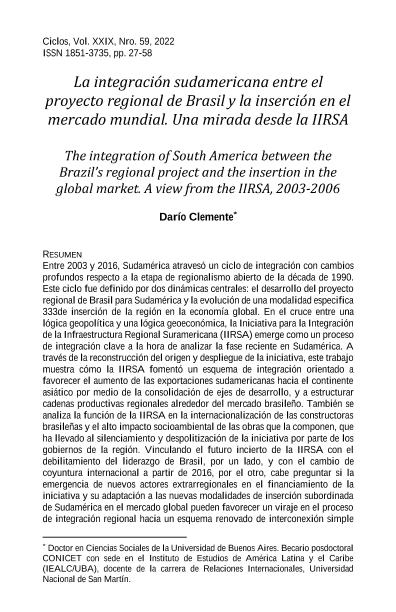Mostrar el registro sencillo del ítem
dc.contributor.author
Clemente, Dario

dc.date.available
2023-07-04T18:01:10Z
dc.date.issued
2022-12
dc.identifier.citation
Clemente, Dario; La integración reciente en Sudamérica entre el proyecto regional de Brasil y la inserción en el mercado mundial: una mirada desde la Iniciativa para la Integración de la Infraestructura Regional Suramericana (2003-2016); Universidad de Buenos Aires. Facultad de Ciencias Económicas. Centro de Investigaciones de Historia Económica, Social y de Relaciones Internacionales; Ciclos en la Historia, la Economia y la Sociedad; 59; 12-2022; 27-58
dc.identifier.issn
0327-4063
dc.identifier.uri
http://hdl.handle.net/11336/202338
dc.description.abstract
Entre 2003 y 2016, Sudamérica ha atravesado un ciclo de integración distintivo, marcado por cambios profundos con respecto a la etapa de “regionalismo abierto” de la década de 1990. Este ciclo ha sido definido por dos dinámicas centrales: el desarrollo del proyecto regional de Brasil para Sudamérica y la evolución de una modalidad especifica de inserción de la región en la economía global. En el cruce entre una “lógica geopolítica” y una “lógica geoeconómica”, la Iniciativa para la Integración de la Infraestructura Regional Suramericana-IIRSA emerge como un proceso de integración clave ala hora de analizar la fase reciente en Sudamérica. A través de la reconstrucción del origen y despliegue de la iniciativa, mostramos como la IIRSA haya fomentado un esquema de integración orientado a favorecer el aumento de las exportaciones sudamericanas hacia el continente asiático por medio de la consolidación de “ejes de desarrollo” y a estructurar cadenas productivas regionales alrededor del mercado brasileño. También analizamos la función de la IIRSA en la internacionalización de las constructoras brasileñas y el alto impacto socioambiental de las obras quela componen, lo cual ha llevado al “silenciamiento” y “despolitización” de la iniciativa por parte delos gobiernos de la región. Vinculando el futuro incierto de la IIRSA con el debilitamiento del liderazgo de Brasil, por un lado, y con el cambio de coyuntura a nivel internacional a partir de 2016,por el otro, nos preguntamos si la emergencia de nuevos actores extrarregionales en el financiamiento de la iniciativa y la adaptación de la misma a las nuevas modalidades de inserción subordinada de Sudamérica en el mercado global pueden favorecer un viraje en el proceso de integración regional hacia un renovado esquema de interconexión simple dictado por la dependencia de las relaciones comerciales con viejos y nuevos mercados compradores.
dc.description.abstract
Between 2003 and 2016, South America has gone through an integration cycle, marked by profound changes when compared with the open regionalism of the 1990s. This cycle has been defined by two central dynamics: the development of the regional project of Brazil and the evolution of a specific modality of insertion of the region in the global economy. At the crossroads between a geopolitical logic and a geoeconomic one, the Initiative for the Integration of Regional Infrastructure in South America (IIRSA) emerges as a key integration process to be analyzed when tackling the recent past in South America. Through the reconstruction of the conception and subsequent deployment of the initiative, we show how IIRSA has promoted an integration scheme aimed at favoring the increase of South American exports to the Asian continent through the consolidation of development axes and at structuring regional production chains centered around the Brazilian market. We also analyze the role of IIRSA in the internationalization of Brazilian construction companies and its high socio-environmental impact, which has led to the silencing and depoliticization of the initiative by the governments of the region. Linking the uncertain future of IIRSA with the weakening of Brazil's leadership, on the one hand, and with the change in the international situation starting in 2016, on the other, we wonder if the emergence of new extraregional actors in the financing of the initiative and the adaptation of IIRSA to the new modalities of subordinate insertion of South America in the global market can favor a shift in the regional integration process towards a renewed scheme of simple interconnection, dictated by the dependence on commercial relations with old and new buying markets.
dc.format
application/pdf
dc.language.iso
spa
dc.publisher
Universidad de Buenos Aires. Facultad de Ciencias Económicas. Centro de Investigaciones de Historia Económica, Social y de Relaciones Internacionales
dc.rights
info:eu-repo/semantics/openAccess
dc.rights.uri
https://creativecommons.org/licenses/by-nc/2.5/ar/
dc.subject
INTEGRACIÓN REGIONAL
dc.subject
IIRSA
dc.subject
SUDAMÉRICA
dc.subject
BRASIL
dc.subject
INSERCIÓN INTERNACIONAL
dc.subject.classification
Otras Ciencia Política

dc.subject.classification
Ciencia Política

dc.subject.classification
CIENCIAS SOCIALES

dc.subject.classification
Geografía Cultural y Económica

dc.subject.classification
Geografía Económica y Social

dc.subject.classification
CIENCIAS SOCIALES

dc.title
La integración reciente en Sudamérica entre el proyecto regional de Brasil y la inserción en el mercado mundial: una mirada desde la Iniciativa para la Integración de la Infraestructura Regional Suramericana (2003-2016)
dc.title
The integration of South America between the Brazil’s regional project and the insertion in the global market: a view from the IIRSA, 2003-2006
dc.type
info:eu-repo/semantics/article
dc.type
info:ar-repo/semantics/artículo
dc.type
info:eu-repo/semantics/publishedVersion
dc.date.updated
2023-06-29T13:13:38Z
dc.journal.number
59
dc.journal.pagination
27-58
dc.journal.pais
Argentina

dc.journal.ciudad
Ciudad Autónoma de Buenos Aires
dc.description.fil
Fil: Clemente, Dario. Consejo Nacional de Investigaciones Científicas y Técnicas; Argentina. Universidad de Buenos Aires. Facultad de Ciencias Sociales. Instituto de Estudios de América Latina y el Caribe; Argentina
dc.journal.title
Ciclos en la Historia, la Economia y la Sociedad

dc.relation.alternativeid
info:eu-repo/semantics/altIdentifier/url/https://ojs.econ.uba.ar/index.php/revistaCICLOS/article/view/2596
dc.relation.alternativeid
info:eu-repo/semantics/altIdentifier/doi/https://doi.org/10.56503/CICLOS/Nro.59(2022)pp.27-58
Archivos asociados
